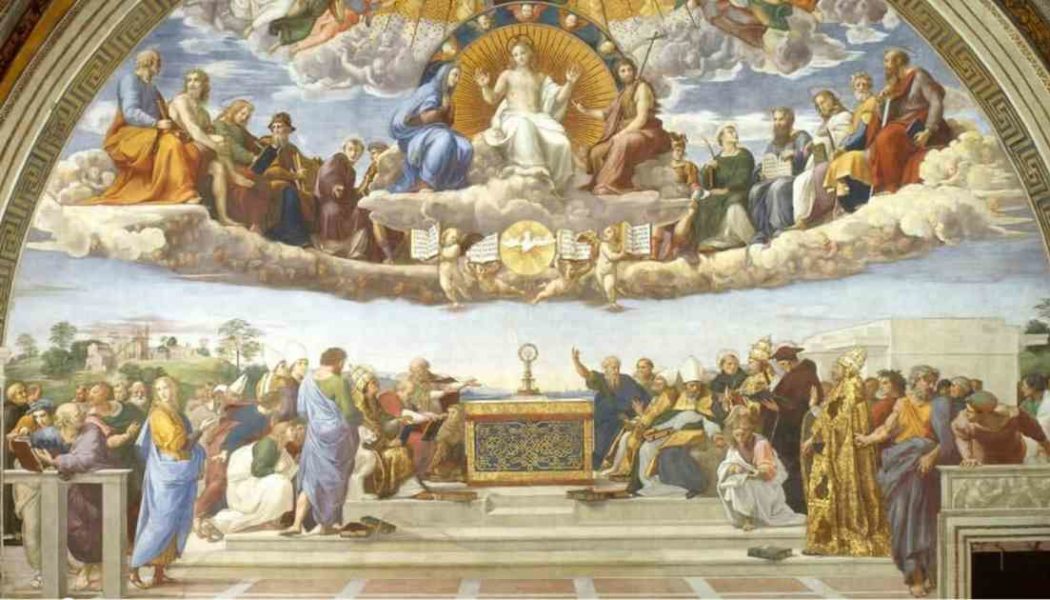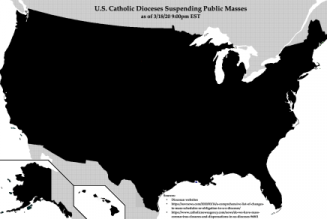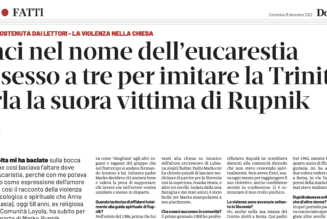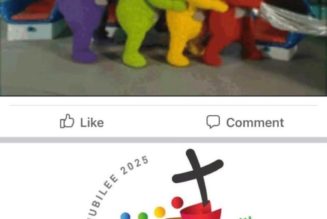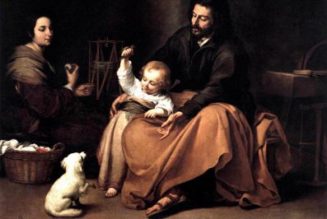
Jesus puts a hard question to the Apostles, and to us, on the 21st Sunday in Ordinary Time Year B.
The Church does a great job of situating his question in a context that shows exactly what is at stake: Do we want to live a one-flesh union of minds and wills with Jesus Christ — or do we want to place ourselves in servitude to his powerless opponents?
It’s the final, decisive moment of Jesus’s own Eucharistic Congress — the fifth of five Sundays whose readings take a deep dive into the sixth chapter of John.
“Do you also want to leave?” he asks his Apostles. And “Yes, kind of,” seems to be their answer.
This is the moment when many of Jesus’s disciples walk away from the life they had found with him. And it seems as if the Twelve are a little iffy on their commitment too. Peter’s first reaction isn’t to say, “No, we don’t want to leave,” but to say words that could mean, “We wish we could leave, but we’re stuck.” He says “Master, to whom shall we go?” The Twelve have left their former lives for Jesus, a radical commitment that in the best of circumstances was hard to justify. Now, with his rhetoric getting increasingly bizarre, they worried that they couldn’t go back.
After the miracle of the loaves, the people wanted to make him a king, or a new Moses, so he let them know just who he was, saying that their job is to “believe in him” because he “come down from heaven.” He capped it all off by saying they must eat his flesh and drink his blood, and it was all too much for them.
They said “This is a hard teaching. Who can accept it?”
Some Christians to this day don’t accept it. In fact, they cite words from this Sunday’s Gospel to reject it. Jesus says: “It is the spirit that gives life, while the flesh is of no avail. The words I have spoken to you are Spirit and life,” and those who want to reject the real presence of Jesus Christ in the Eucharist take that as Jesus signaling that he is speaking symbolically, not literally.
But, clearly, when he said those words 2,000 years ago in Capernaum, no one thought he was only speaking symbolically. The next thing we learn is that:
“As a result of this, many of his disciples returned to their former way of life and no longer accompanied him.”
Why did they leave him? I like what Augustine says: “They understood flesh as [something that] is torn to pieces in a carcass or sold in a meat market, not as [something that] is enlivened by a spirit. And so it was said, ‘The flesh profits nothing.’” On the other hand, said Augustine, “Let spirit be added to flesh … and it profits very much. For if flesh profited nothing, the Word would not have become flesh to dwell among us.”
And if flesh profited nothing, his death and resurrection in the flesh would have profited nothing either, for that matter.
But there is another important way to understand what Jesus means by, “It is the spirit that gives life, while the flesh is of no avail.” And that’s this: Receiving Eucharistic communion is not magic. The chalice at Mass is not a mythical Holy Grail that grants superpowers to those who partake of it apart from a relationship with Christ. Without faith, the Eucharist does nothing — in fact, eating the flesh and blood of Christ without belief or in a state of sin does harm, according to St. Paul.
In fact, the very next thing Jesus says is “But there are some of you who do not believe,” and the Gospel singles out Judas, identifying this moment as the moment the betrayer left Jesus in his heart. And sure enough, later Judas leaves to betray Jesus immediately after receiving communion at the Institution of the Eucharist.
Truly, the Real Presence of Christ in the Blessed Sacrament is of no avail if you have no faith.
But look at what it does for St. Peter and St. Paul, who do have faith.
After his initial question, St. Peter gives a beautiful positive profession of faith; much like St. Paul does this Sunday.
After Peter asks “to whom shall we go?” he says, “You have the words of eternal life. We have come to believe and are convinced that you are the Holy One of God.”
In other words, he’s not stuck with Jesus so much as he is all-in with Jesus. He is like a good theologian who has “faith seeking understanding.” He may not understand everything Jesus says, but he knows who Jesus is, so he will defend Jesus’s words, even when he can’t explain them.
St. John Chrysostom has high praise for Peter’s words here, calling them, “A speech of the greatest love, proving that Christ was more precious to them than father or mother.” It is, in fact, the kind of love a spouse has for a spouse, sometimes to a fault. We say to each other: “Whatever happens in your life is something that is happening in our life, together, and I will take your side, no matter what.”
This is why the Church pairs this Sunday’s Gospel with this Sunday’s Second Reading from St. Paul’s letter to the Ephesians. Paul gives a long meditation comparing the married relationship and the Church’s relationship with Christ, saying that the two relationships are the same kind of thing.
Paul echoes Jesus in quoting Genesis on marriage, saying: “For this reason a man shall leave his father and his mother and be joined to his wife, and the two shall become one flesh.” Then Paul adds: “This is a great mystery, but I speak in reference to Christ and the church.”
The Fathers of the Church took this analogy very literally: The Church, and each Christian, is the bride and Christ is the bridegroom. As Theodoret of Cyrus (393-458/466) wrote, “Just as Eve was fashioned from Adam, so were we from Christ the Lord. We are buried with him in baptism. We rise with him. We eat and drink his blood.”
When we unite with him in communion, we are the bride receiving the body of Jesus Christ, the Bridegroom. The Old Testament Song of Songs is a love poem that spells out just what this marriage looks like, with us longing for Jesus Christ, and the Lord longing to be united with us.
Just as a man “leaves” his parents and “cleaves” to his wife, Jesus the Bridegroom leaves his Father’s house in the incarnation and cleaves with us in the Eucharist, becoming one flesh. And, like brides, we leave our former family to make Christ our highest priority and our new identity. From the Early Church on, Christians have said that “Any soul that cleaves faithfully to Christ is like a wife living faithfully with her husband.”
And what an amazing husband. He loves us more than himself, St. Paul says: He “handed himself over” to save us, and in baptism he “cleanses us by the bath of water with the word” in order to restore his bride’s beauty “without spot or wrinkle or any such thing” to be “holy and without blemish.”
So, this is what Jesus offers us in the Eucharist. And now, we have a decision to make.
In the First Reading, Joshua gathers the tribes of Israel together in the Promised Land which they have conquered. Joshua is a new Moses. He knows man is made for worship, and if we don’t worship God, something else will become our god. Today is his version of the offer Moses made when he said: “I have set before you life and death, the blessing and the curse. So choose life, in order that you may live.”
Joshua tells the people they will have to either serve the Lord or they will find themselves in thrall to the pitiless gods of the world who are dealers of death. Then Joshua makes his choice: “As for me and my household, we will serve the Lord.”
His conviction is contagious. The people rally and do the same. The same thing happens when Peter says “Master, to whom shall we go? … You are the Holy One of God.” Peter’s faith rallies the Twelve — except for one, the one who will hand Jesus over for money.
In 21st century America, where the false gods of money, pleasure, and power beckon and many of our relatives and neighbors have succumbed, God needs new Joshuas and new Peters in every family, community and parish.
He has spent four weeks preparing us to answer this question and he is looking at each of us, waiting to see what we will decide.
- We can go for flashy wealth that never satisfies, or we can be the spouse of the One whose everyday providence never ends, as we learned in Sunday 1 of Jesus’s Eucharistic congress.
- We can go for easy pleasures that enslave us, or trust that the Lord brings freedom, as we learned in Sunday 2.
- We can chase the worldly power that leaves us exhausted, or enter into the slow subtle power of eternal life, as we learned in Sunday 3.
- Our Exodus begins with eating the flesh of the Lamb of God, as we learned on Sunday 4.
The time to decide has arrived. This Sunday in the communion line our “Amen” means what Joshua said: “As for me and my household, we will serve the Lord.”
And now I can complete the rhyme I invented to keep these five weeks straight in my head.
I offered verses 1-4 before, each verse corresponding with the themes of the first four weeks in these August’s dive into the sixth chapter of the Gospel of John. Here is how it finishes:
1. What we give, he multiplies.
2. With his works, he testifies.
3. With his flesh, he fortifies.
4. In his Church, he sanctifies.
5. So join the one who never dies.
At Communion time today, tell him your answer and leave the church ready to join his great effort to banish the powers of death and return the world to the Kingdom of life and light that it was intended to be.
Image: Raphael, Disputation of the Sacrament, Wikimedia commons.
